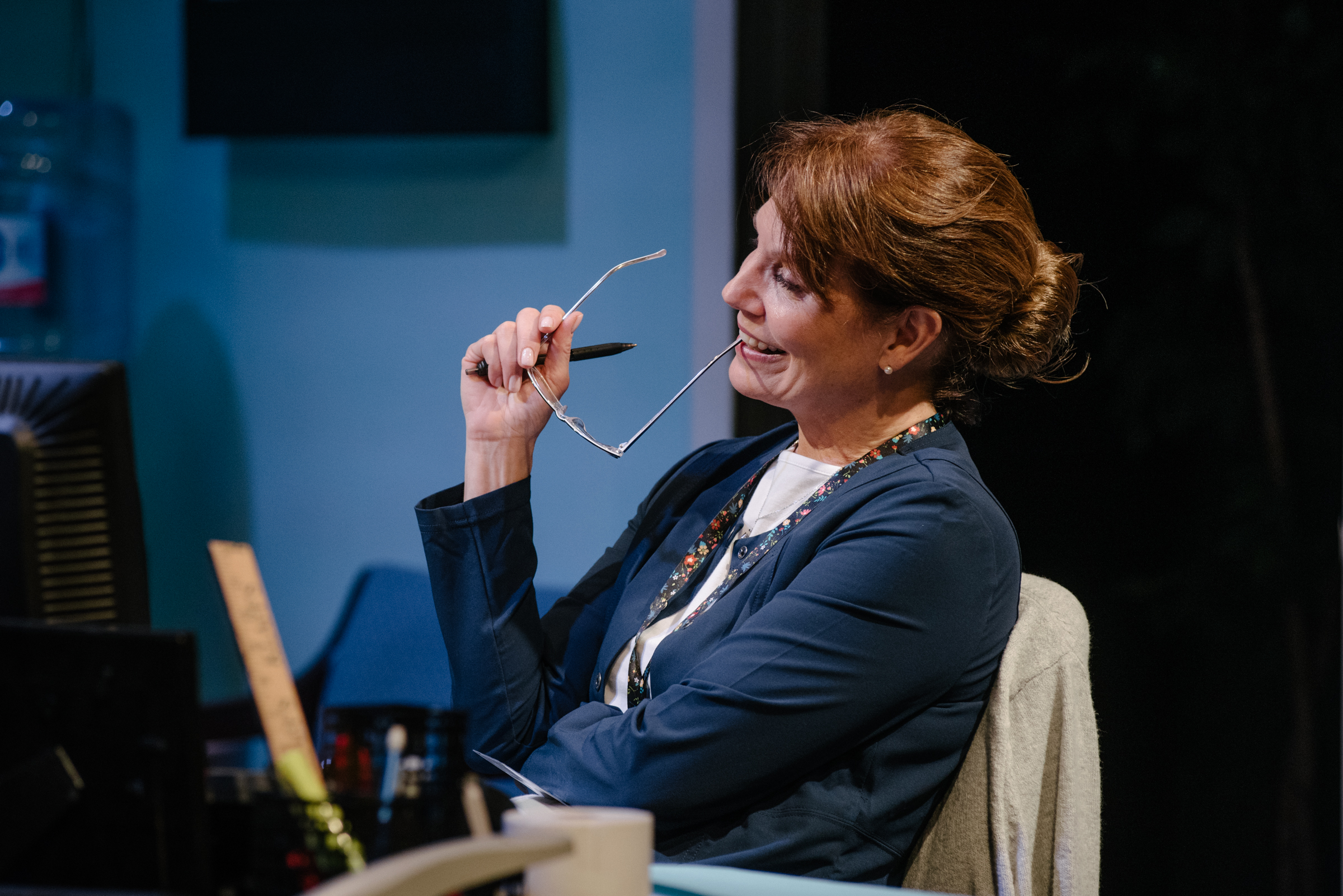Review of Rasheeda Speaking, Collective Consciousness Theatre
Joel Drake Johnson’s Rasheeda Speaking, Collective Consciousness Theatre’s second feature of the season, is billed as a “comedy-thriller,” centered on workplace racism—in both its more and less deliberate registers. The play, directed by Elizabeth Nearing, is more comedy than thriller, providing many a knowing chuckle about the way office politics takes its tone from favoritism and ostracism and how easily racism plays into both.
Jaclyn Spaulding (Gracy Brown) (photographs courtesy of Collective Consciousness Theatre)
At CCT, the play provides a plum role for local actress Gracy Brown. She plays Jaclyn, an African American employee—for the past sixth months—of Dr. Williams (Ethan Warner-Crane), the kind of white boss who hires a woman of color as a way of doing a “good thing,” then regrets it and looks for reasons to get rid of her. As Jaclyn, Brown’s capable presence holds our sympathy even when she’s being rather unsympathetic to a timorous patient, Rose Saunders (Debra Walsh). Because Jaclyn is free—at least at the start—of ulterior motives, she is a welcome contrast to Dr. Williams and his recently promoted office manager Illeen (Susan Kulp), who open the play conniving against Jaclyn before we even meet her. When she arrives, Jaclyn carries herself with a no-nonsense work ethic that does seem a bit hard-edged after the doctor’s touchy-feely flattery of Ileen. By insisting on being called “Jaclyn,” rather than the doctor’s preferred nickname, “Jackie,” Jaclyn strikes her boss as the kind of worker that doesn’t “fit in” with the office as he’d have it be.
Dr. David Williams (Ethan Warner-Crane), Ileen Van Meter (Susan Kulp)
One of the play’s best comic features is how Jaclyn subtly turns the tables. She begins the play at a distinct disadvantage—she’s been out sick for five days, due to—we’re told by Williams—anxiety attacks and, in her own view, the ill effects of toxins in the office. Her return is met by Williams’ efforts to get enough bad notes on her to get her transferred. Illeen, who may live to regret how easily she lets the doctor turn her into a stoolie, takes on the role of spying while denying it. In the early going, the two office assistants show traces of the friendliness that, until now, they used with one another—as Ileen fondly recalls Jaclyn’s “yammering,” and Jaclyn—while complaining relentlessly about how messy and disorganized Ileen is—entertains her colleague with tales of her noisy Mexican neighbors. Eventually we will see how much of Jaclyn’s behavior is a form of performance.
The escalation of the tensions between them—with Jaclyn trying to bedevil her colleague at times and, at other times, making conciliatory gestures—almost goes a bit too far, with Ileen becoming the anxious one, confused and scared by Jaclyn’s mood-swings. It’s to Kulp’s credit that, as Ileen starts to veer off her usual ingratiating manner, we can believe how swiftly she is at her wits’ end (all the action takes place in four days). Ileen emerges as a woman without much mind or backbone of her own, easily caught up in her boss’s machinations while unable to be the tough-minded office manager he believes he needs.
Ileen Van Meter (Susan Kulp)
As Doctor Williams, Ethan Warner-Crane has a distracted manner, as if he’s barely aware of the people who work for him as more than extensions of his own day. He’s boyish as befits a boss who is younger than his employees, and the women’s efforts to fatten him up with sweet rolls and pecan pie, while each accuses the other of having a crush on him, serves to remind us that sexism is also a part of the workplace dynamic. Ageism comes in a bit more subtly with the way everyone treats Mrs. Saunders as though a child not fully in possession of her faculties. Meanwhile, offstage, there are Rose’s son and Ileen’s husband and son, who all provide repeated insights about how Jaclyn’s behavior is a symptom of the anger “her people” feel about slavery.
Jaclyn (Gracy Brown), Rose Saunders (Debra Walsh), Ileen (Susan Kulp)
There are symptoms aplenty on view here, certainly. But what’s the cure? Johnson’s play doesn’t have any answers, perhaps, but it does end where we can see what might have been clear to an unbiased viewer all along: Jaclyn is the better worker, if only her boss would treat her as a person and not a problem.
Rasheeda Speaking
By Joel Drake Johnson
Directed by Elizabeth Nearing
Producers: Jenny Nelson and Dexter J. Singleton; Costume Design: Carol Koumbaros; Sound Design: Tommy Rosati; Lighting Design: Jamie Burnett; Set Design: David Sepulveda; Stage Manager: Ashley Sweet; Assistant Stage Manager/Propsmaster: Molly Flanagan
Cast: Gracy Brown, Susan Kulp, Debra Walsh, Ethan Warner-Crane
Collective Consciousness Theatre
January 17-February 3, 2019





